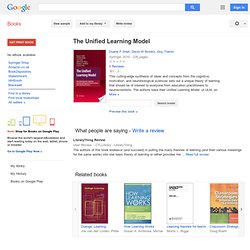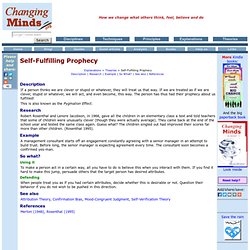

Course 1, Chapter 4 - Theories of and Approaches to Learning. The Unified Learning Model. This cutting-edge synthesis of ideas and concepts from the cognitive, motivation, and neurobiological sciences sets out a unique theory of learning that should be of interest to everyone from education practitioners to neuroscientists.

The authors base their Unified Learning Model, or ULM, on three core principles. Firstly, that learning requires working memory allocation (attention). Second, that working memory's capacity for allocation is affected by prior knowledge. Cognitive Theory - Definition of Cognitive Theory. What Is Behaviorism? Question: What Is Behaviorism?

Behaviorism can perhaps be best summed up by the following quote from the famous psychologist John B. Watson: "Give me a dozen healthy infants, well-formed, and my own specified world to bring them up in and I'll guarantee to take any one at random and train him to become any type of specialist I might select -- doctor, lawyer, artist, merchant-chief and, yes, even beggar-man and thief, regardless of his talents, penchants, tendencies, abilities, vocations, and race of his ancestors. " --John Watson, Behaviorism, 1930 What exactly did Watson mean? Answer: The term behaviorism refers to the school of psychology founded by John B. The Pygmalion Effect. The Pygmalion Effect and Self-Fulfilling Prophecy (The Secret) - Refer to situations where once an expectation is set, even if it is not true, some of us will act in ways that are consistent with that expectation.

The expectation then becomes true. We act out who we think we are and not who we truly are. An example might be a student with low confidence or low self-esteem constantly telling them self that ‘I am useless’, ‘I am unintelligent’ or ‘I am a failure’. The outcome will mirror the false beliefs or false expectations. He or she will never achieve anything especially getting good grades at school. Other people can knowingly or unknowingly establish a false belief or false expectation. If we believe that body language makes up the greater part of our communication then a teacher only needs to believe that a young person is a failure. If you remember Pygmalion by the Playwright George Bernard Shaw, we see something similar.
How to Grow a Sunflower in a Pot: 14 steps (with pictures) Edit Article Edited by Tomasi0202, Lois Wade, Maluniu, Kals and 20 others Sunflowers have many uses such as for producing bio-diesel and cooking oil.

But the best use of a sunflower is to brighten up your garden during the sunnier months of the year, or even to brighten the greenhouse or a sunroom any time of the year. This quick guide to growing a sunflower in a container is something even children can enjoy as a fast and fun garden project. Brighten your day with homegrown sunflowers. Ad Steps 1 Purchase sunflower seeds. 14 If you want to make culinary use of the sunflower, the petals from the flowers make a pretty addition to salads, and both the seeds and the buds can also be eaten.To get the seeds, you have to let the flower die on the plant and just wait. Video Tips The bigger the pot, the bigger the sunflower, especially if you're not growing dwarf varieties.If sowing sunflowers in the ground, the earlier you sown them in late spring, the sooner they'll flower.
CBeebies - Mr Bloom's Nursery Planting Seeds. Humanistic Theory. To love oneself is the beginning of a life-long romance - Oscar Wilde The humanistic theory of personality is by far the most unscientific - or I should say untestable - of the five basic theories.

It is usually referred to as "free to be you and me, hug a tree crap", or more realistically, "pop psychology". It thrives on the idea that every human being has the potential to be a good, contibuting, lovable member of society if their "pyramid of needs" is filled. It also houses the idea of self-image and esteem.
The humanistic movement was led by Abraham Maslow and Carl Rogers, as a response to Freud's brutally negative view of humans in general, picturing them as "bad" people motivated only by sex and violence. Science Lesson Plans / RHS Campaign for School Gardening. Self-Fulfilling Prophecy. Explanations > Theories > Self-Fulfilling Prophecy Description | Research | Example | So What?

| See also | References Description If a person thinks we are clever or stupid or whatever, they will treat us that way. If we are treated as if we are clever, stupid or whatever, we will act, and even become, this way. This is also known as the Pygmalion Effect. Research Robert Rosenthal and Lenore Jacobson, in 1968, gave all the children in an elementary class a test and told teachers that some of children were unusually clever (though they were actually average). Example A management consultant starts off an engagement constantly agreeing with a senior manager in an attempt to build trust. So what? Using it To make a person act in a certain way, all you have to do is believe this when you interact with them. Defending When people treat you as if you had certain attributes, decide whether this is desirable or not. Plants - Interactive Science Games and Activities.